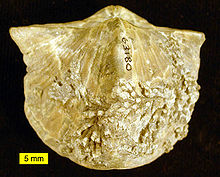Spiriferida
| Spiriferida Temporal range:
| |
|---|---|

| |
| Mucrospirifer mucronatus | |
| Scientific classification | |
| Domain: | Eukaryota |
| Kingdom: | Animalia |
| Phylum: | Brachiopoda |
| Class: | Rhynchonellata |
| Order: | †Spiriferida Waagen, 1883 |
| Subgroups | |

Spiriferida is an order of extinct articulate brachiopod fossils which are known for their long hinge-line, which is often the widest part of the shell. In some genera (e.g. Mucrospirifer) it is greatly elongated, giving them a wing-like appearance. They often have a deep fold down the center of the shell. The feature that gives the spiriferids their name ("spiral-bearers") is the internal support for the lophophore; this brachidium, which is often preserved in fossils, is a thin ribbon of calcite that is typically coiled tightly within the shell.
Spiriferids first appear in the Late Ordovician with the appearance of Eospirifer radiatus. They increased in diversity throughout the Silurian and underwent a dramatic evolutionary radiation during the Devonian period, reaching peak development in variety and numbers. Spiriferida survived the great Permian extinction (Albeit at much less diversity), finally becoming extinct during the Early to Middle Jurassic.[1]
Fossils of this order are often preserved as pyrite.
Taxonomy
[edit]Order Spiriferida
- Suborder Delthyridina
- Superfamily Delthyridoidea
- Family Acrospiriferidae
- Family Cyrtinopsidae
- Family Delthyrididae
- Family Hysterolitidae
- Family Mucrospiriferidae
- Superfamily Reticularioidea
- Family Elythidae
- Family Reticulariidae
- Family Thomasariidae
- Family Xenomartiniidae
- Superfamily Delthyridoidea
- Suborder Spiriferidina
- Superfamily Adolfioidea
- Family Adolfiidae
- Family Echinospiriferidae
- Superfamily Ambocoelioidea
- Family Ambocoeliidae
- Family Eudoxinidae
- Family Lazutkiniidae
- Family Verneuiliidae
- Superfamily Brachythyridoidea
- Family Brachythyrididae
- Family Skelidorygmidae
- Superfamily Cyrtioidea (syn. Cyrtiacea)
- Family Costispiriferidae
- Family Cyrtiidae
- Family Hedeinopsidae
- Superfamily Cyrtospiriferoidea
- Family Conispiriferidae
- Family Cyrtospiriferidae
- Family Spinocyrtiidae
- Superfamily Martinioidea
- Family Crassumbidae
- Family Elythynidae
- Family Gerkispiridae
- Family Ingelarellidae
- Family Martiniidae
- Family Perissothyrididae
- Family Tenellodermidae
- Superfamily Paeckelmanelloidea
- Family Paeckelmanellidae
- Family Strophopleuridae
- Superfamily Spiriferoidea
- Family Choristitidae
- Family Imbrexiidae
- Family Reticulariacea
- Family Spiriferellidae
- Family Spiriferidae
- Family Trigonotretidae
- Superfamily Theodossioidea
- Family Palaeochoristitidae
- Family Theodossiidae
- Family Ulbospiriferidae
- Superfamily Adolfioidea
References
[edit]- ^ Barnes BD, Sclafani JA, Zaffos A (April 2021). "Dead clades walking are a pervasive macroevolutionary pattern". Proceedings of the National Academy of Sciences of the United States of America. 118 (15). doi:10.1073/pnas.2019208118. PMC 8053996. PMID 33827921. S2CID 233184869.
- Introduction to the Spiriferida at berkeley.edu
- Spiriferida at the Paleos website
- Zhan, RenBin, JiSuo Jin, Yan Liang, and LingKai Meng. "Evolution and paleogeography of Eospirifer (Spiriferida, Brachiopoda) in Late Ordovician and Silurian." Science China Earth Sciences 55, no. 9 (2012): 1427–1444.

